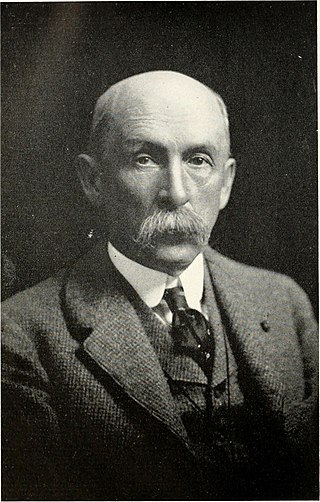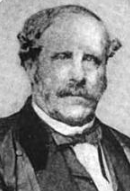
Presidential elections were held in the United States from November 2 to December 5, 1832. Incumbent president Andrew Jackson, candidate of the Democratic Party, defeated Henry Clay, candidate of the National Republican Party.

Presidential elections were held in the United States on November 2, 1852. Democratic nominee Franklin Pierce defeated Whig nominee General Winfield Scott.

The Republican National Convention (RNC) is a series of presidential nominating conventions held every four years since 1856 by the Republican Party in the United States. They are administered by the Republican National Committee. The goal of the Republican National Convention is to officially nominate and confirm a candidate for president and vice president, adopt a comprehensive party platform and unify the party, as well as publicize and launch the fall campaign.

Daniel Henry Chamberlain was an American planter, lawyer, author and the 76th Governor of South Carolina from 1874 until 1876 or 1877. The federal government withdrew troops from the state and ended Reconstruction that year. Chamberlain was the last Republican governor of South Carolina until James B. Edwards was elected in 1974.
In the United States, the Conservative Party refers to a collection of state-level parties that operate independently and advocate for conservative principles. Currently, there is no national Conservative Party. Historically, many of these parties emerged from divisions within the Democratic and Republican parties, supporting a variety of conservative ideologies, including fiscal conservatism, social conservatism, states' rights, and nationalism.
The Independent Republican Party of South Carolina was a political party of South Carolina during Reconstruction. It was founded in 1872 to oppose the election of Franklin J. Moses Jr. for Governor of South Carolina after he had been nominated by the Republicans on August 21, 1872. Former governor James Lawrence Orr denounced the selection of Moses and led the formation of a new party.

The 1876 South Carolina gubernatorial election was held on November 7, 1876, to select the governor of the state of South Carolina. The election campaign was a referendum on the Radical Republican-led state government and their Reconstruction policies. Opponents disputed the challenger Wade Hampton III's victory, gained by a margin of little more than 1100 votes statewide. But he took office in April 1877, after President Hayes withdrew federal troops as a result of a national Democratic compromise, and the incumbent Daniel Henry Chamberlain left the state.

The 1870 South Carolina gubernatorial election was held on October 19, 1870, to select the governor of the state of South Carolina. Governor Robert Kingston Scott easily won reelection based entirely on the strength of the black vote in the state. The election was significant because white conservatives of the state claimed it showed that political harmony between the white and black races was impossible and only through a straightout Democratic attempt would they be able to regain control of state government.

The 1874 South Carolina gubernatorial election was held on November 3, 1874, to select the governor and lieutenant governor of the state of South Carolina. Daniel Henry Chamberlain won the election and became the 76th governor of South Carolina.

The 1880 South Carolina gubernatorial election was held on November 2, 1880 to s elect the governor of South Carolina. Johnson Hagood was nominated by the Democrats and ran against L. W. R. Blair, a Greenback-Labor candidate. Hagood easily won the general election and became the 80th governor of South Carolina.

The 1882 South Carolina gubernatorial election was held on November 7, 1882 to select the governor of the state of South Carolina. Hugh Smith Thompson was nominated by the Democrats and ran against J. Hendrix McLane, a Greenback-Labor candidate. Thompson easily won the general election and became the 81st governor of South Carolina.

The 1886 South Carolina gubernatorial election was held on November 2, 1886, to select the governor of the state of South Carolina. John Peter Richardson III was nominated by the Democrats and became the 83rd governor of South Carolina.

The 1888 South Carolina gubernatorial election was held on November 6, 1888, to select the governor of the state of South Carolina. John Peter Richardson III was renominated by the Democrats and was reelected for a second two-year term.

The 1890 South Carolina gubernatorial election was held on Tuesday November 4, to elect the governor of South Carolina. Ben Tillman was nominated by the Democrats and easily won the general election against A.C. Haskell to become the 84th governor of South Carolina.

The 1892 South Carolina gubernatorial election was held on November 8, 1892, to select the governor of the state of South Carolina. Governor Ben Tillman was renominated by the Democrats and was elected in the general election to a second two-year term.

Franklin J. Moses Sr. was an attorney, planter, politician and judge in South Carolina. He served as a state senator from 1841 to 1866, when he was elected to the circuit court. He was elected as Chief Justice of the State Supreme Court in 1868 during the Reconstruction era. In 1876 he was asked to rule on a challenge to election returns in the hotly disputed gubernatorial campaign, eventually won by Democrat Wade Hampton and ending Republican domination in the state.

The 1902 New York state election was held on November 4, 1902, to elect the governor, the lieutenant governor, the Secretary of State, the state comptroller, the attorney general, the state treasurer, the state engineer and a judge of the New York Court of Appeals, as well as all members of the New York State Assembly and the New York State Senate.

The 1872 Democratic National Convention was a presidential nominating convention held at Ford's Grand Opera House on East Fayette Street, between North Howard and North Eutaw Streets, in Baltimore, Maryland on July 9 and 10, 1872. It resulted in the nomination of newspaper publisher Horace Greeley of New York and Governor Benjamin Gratz Brown of Missouri for president and vice president, a ticket previously nominated by the rump Liberal Republican faction convention meeting, also held in Baltimore's newly built premier Opera House of nationally well-known theatre owner/operator John T. Ford of the major Republican Party, which had already re-nominated incumbent President Ulysses S. Grant of the regular Republicans for another term.

The 1860 United States presidential election in South Carolina took place on November 6, 1860, as part of this 1860 United States presidential election. The state legislature chose eight representatives, or electors to the Electoral College, who voted for president and vice president. By 1860, South Carolina was the only state using this procedure in a presidential election and would be the last time the state would do so.
"Straight-Out Democratic Party" is the name used by three minor American political parties between 1872 and 1890.

















